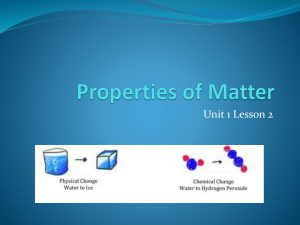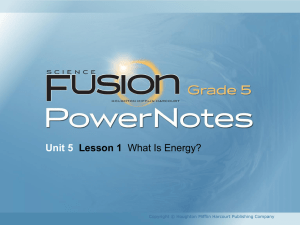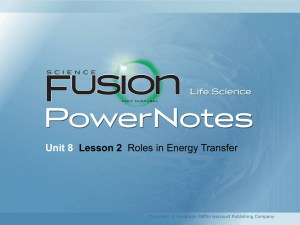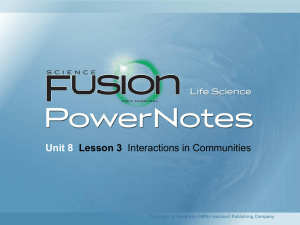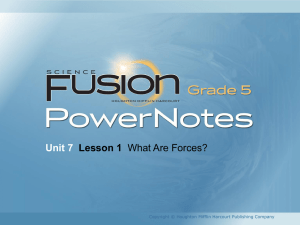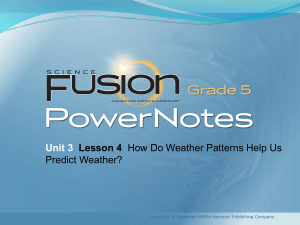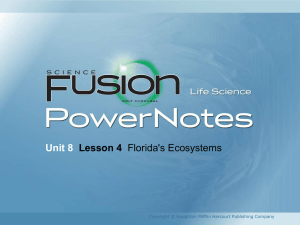6-1_CFLAEAS493558_U09L02
advertisement
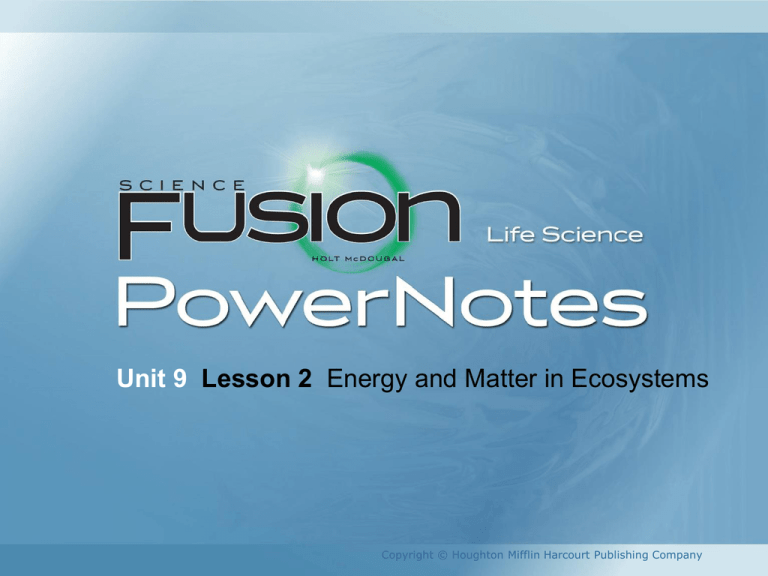
Unit 9 Lesson 2 Energy and Matter in Ecosystems Copyright © Houghton Mifflin Harcourt Publishing Company Unit 9 Lesson 2 Energy and Matter in Ecosystems Florida Benchmarks • SC.8.N.1.1 Define a problem from the eighth grade curriculum using appropriate reference materials to support scientific understanding, plan and carry out scientific investigations of various types, such as systematic observations or experiments, identify variables, collect and organize data, interpret data in charts, tables, and graphics, analyze information, make predictions, and defend conclusions. Copyright © Houghton Mifflin Harcourt Publishing Company Unit 9 Lesson 2 Energy and Matter in Ecosystems Florida Benchmarks • SC.8.N.3.1 Select models useful in relating the results of their own investigations. • SC.8.L.18.3 Construct a scientific model of the carbon cycle to show how matter and energy are continuously transferred within and between organisms and their physical environment. Copyright © Houghton Mifflin Harcourt Publishing Company Unit 9 Lesson 2 Energy and Matter in Ecosystems Florida Benchmarks • SC.8.L.18.4 Cite evidence that living systems follow the Laws of Conservation of Mass and Energy. • LA.6.4.2.2 The student will record information (e.g., observations, notes, lists, charts, legends) related to a topic, including visual aids to organize and record information and include a list of sources used. Copyright © Houghton Mifflin Harcourt Publishing Company Unit 9 Lesson 2 Energy and Matter in Ecosystems Soak Up the Sun How do organisms get energy and matter? • Energy is the ability to do work. • Matter is anything that has mass and takes up space. • All organisms need energy and matter to survive, grow, and reproduce. Copyright © Houghton Mifflin Harcourt Publishing Company Unit 9 Lesson 2 Energy and Matter in Ecosystems How do organisms get energy and matter? • The sun is the original source of energy for most ecosystems. • Organisms called producers make their own food. • Consumers are organisms that cannot make their own food and eat producers or other consumers to get energy. Copyright © Houghton Mifflin Harcourt Publishing Company Unit 9 Lesson 2 Energy and Matter in Ecosystems How do organisms get energy and matter? • Producers get energy from the sun. • Some producers use chemical energy instead of light energy to make food. • Producers get matter from soil and air. • Consumers get both energy and matter from the foods they eat. Copyright © Houghton Mifflin Harcourt Publishing Company Unit 9 Lesson 2 Energy and Matter in Ecosystems What happens to energy and matter in ecosystems? • The law of conservation of energy states that energy cannot be created or destroyed; it only changes form. • The law of conservation of mass states that mass cannot be created or destroyed. • Mass moves in different forms through the environment. Copyright © Houghton Mifflin Harcourt Publishing Company Unit 9 Lesson 2 Energy and Matter in Ecosystems What happens to energy and matter in ecosystems? • Matter and energy can leave an ecosystem when organisms move. • Matter and energy can leave an ecosystem by the actions of Earth processes, such as water and air movement. • The matter and energy are never destroyed. Copyright © Houghton Mifflin Harcourt Publishing Company Unit 9 Lesson 2 Energy and Matter in Ecosystems Cycle and Flow How does energy move through an ecosystem? • Some energy is lost to the environment as heat. • Energy is also stored within organisms. • An energy pyramid is a tool that can be used to trace the flow of energy through an ecosystem. Copyright © Houghton Mifflin Harcourt Publishing Company Unit 9 Lesson 2 Energy and Matter in Ecosystems How does energy move through an ecosystem? • How does the size of a population change at each step in an energy pyramid? Copyright © Houghton Mifflin Harcourt Publishing Company Unit 9 Lesson 2 Energy and Matter in Ecosystems How does matter move through an ecosystem? • Producers use matter from the physical environment. • Primary consumers use the matter in producers. • Secondary consumers use the matter in primary consumers. Copyright © Houghton Mifflin Harcourt Publishing Company Unit 9 Lesson 2 Energy and Matter in Ecosystems How does matter move through an ecosystem? • Matter such as water, carbon, nitrogen, phosphorus, and oxygen flows from producers to consumers. • Decomposers break down waste products and dead organisms and return them to the physical environment. Copyright © Houghton Mifflin Harcourt Publishing Company Unit 9 Lesson 2 Energy and Matter in Ecosystems How does matter move through an ecosystem? • Carbon is an important building block of organisms. • Carbon is found in food, the atmosphere, water, rocks, soils, organisms, and fossil fuels. • Energy and matter move through organisms and between organisms and the physical environment in the carbon cycle. Copyright © Houghton Mifflin Harcourt Publishing Company Unit 9 Lesson 2 Energy and Matter in Ecosystems How does matter move through an ecosystem? • During photosynthesis, producers make sugars that contain carbon. • During cellular respiration, sugars are broken down to release energy. Copyright © Houghton Mifflin Harcourt Publishing Company Unit 9 Lesson 2 Energy and Matter in Ecosystems How does matter move through an ecosystem? • Combustion, or the burning of once-living materials, releases carbon. • The burning of fossil fuels releases carbon into the air. • Decomposition breaks down dead organisms and waste, releasing carbon back to the environment. Copyright © Houghton Mifflin Harcourt Publishing Company Unit 9 Lesson 2 Energy and Matter in Ecosystems How does matter move through an ecosystem? • How does the carbon cycle move matter through ecosystems? Copyright © Houghton Mifflin Harcourt Publishing Company
